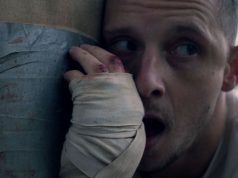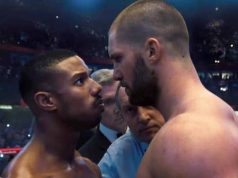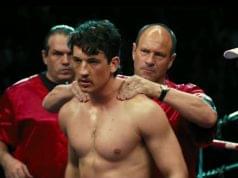You have every reason to scoff at the idea of another “Rocky” movie. But consider how many stale franchises have recently been rejuvenated. Batman, Superman, and James Bond have found new life, so is it not reasonable to believe the same could happen for the Italian Stallion? Isn’t the whole ethos of the “Rocky” pictures the idea that the underdog can always come from behind to surprise you?
I’m pleased to report that “Rocky Balboa” does indeed serve as a fitting finale to Sylvester Stallone’s 30-year-old series. I don’t think it should be a restart, the way “Batman Begins” or “Superman Returns” or “Casino Royale” were for their respective characters. Those films were clearly meant to begin things anew, whereas “Rocky Balboa” is a means of finding closure.
Stallone and Rocky are both 60 now, and have both had some time out of the spotlight to reflect. In “Rocky Balboa,” the champ is pleasantly retired, running a neighborhood restaurant called Adrian’s, where he dons a sports coat and regales diners with glory-day stories. But he misses Adrian, who died a few years ago, and his relationship with their son, Rocky-but-call-me-Robert (Milo Ventimiglia), is fractured. With Dad known and beloved by everyone in Philadelphia, Junior feels stuck in his shadow.
Rocky visits Adrian’s grave regularly and thinks of her often. (We see Talia Shire in snippets of flashbacks from the earlier films.) He does chin-ups in the backyard of his simple Philly one-story. He and Adrian’s brother Paulie (Burt Young) are still close. Rocky’s life is serene enough, but he feels somehow incomplete. Here again, Rocky’s need for closure parallels Stallone’s.
So what’s that you say? An excuse to get in the ring again?! An ESPN “Then & Now” hypothetical match says a fight between Rocky and the current heavyweight champion, the unpopular and vain Mason “The Line” Dixon (Antonio Tarver), would end with Rocky victorious. Dixon disputes it, of course, and a for-charity exhibition match between the two is arranged.
While it sounds like nothing more than another bad “Rocky” sequel, it’s worth noting that this installment isn’t called “Rocky VI.” The absence of a Roman numeral is meant to indicate that this is something else, and it truly is. For the first time in years, Rocky isn’t fighting again just because Stallone wanted to make another sequel. He’s fighting because it’s what Rocky, the character, needs to do.
The film, directed and written by Stallone (he’s written them all and directed all but I and V), returns to the themes of the original 1976 Oscar-winner. Once again it is the story of a slightly downtrodden white man seeking to lift himself out of the doldrums by fighting an arrogant black champion, and once again Rocky is wooing, albeit much more tentatively this time, a reticent woman. She is Marie (Geraldine Hughes) this time, a been-around-the-block bartender with a teenage son named Steps (James Francis Kelly III). Rocky is good with the kid, and Marie and Rocky both warm up to the idea of being in each other’s lives.
In fact, this entry goes back to the roots of the character so extensively that “Rocky” and “Rocky Balboa” stand alone as a complete, well-balanced pair of movies. You could skip the intervening sequels and not lose any of the heart of the story. (If you haven’t seen the original in a while, you might be surprised how unlike the sequels it is.) The series misses Mickey, Adrian, and Apollo Creed, of course, but the fact of their deaths gives this final chapter more weight. Rocky is aware of his own mortality.
Stallone writes such vivid characters, people whose language is alive with the sounds of the streets. They make corny jokes, they mangle sentences; Rocky, in particular, can say things that look dumb on paper but have a certain charming wisdom to them when they come out of his unassuming, slightly slack-jawed mouth. He comes off here as a genuinely lovable, sometimes pitiable character, the sort of simple, decent man whom it would be heartless not to like.
The film’s only real weakness is that is feels drawn out in some places, rushed in others. Rocky’s rift with his son should be more fleshed out, for example, and Steps barely serves a function in the story at all. Rocky’s training sequence feels a little perfunctory, too, although I have to say Bill Conti’s legendary musical score still has a rousing quality no matter how many times you hear it. And the climactic boxing match is giddily suspenseful, the way it ought to be.
“Rocky V” was such a wreck that most fans hate it, and I can’t remember a single thing about it. (I’m sure I haven’t seen it since 1990, when it was released.) Here, then, is a replacement film, a more tender and emotional finale that stirs the soul almost as well as the first one did. Stallone knows it, too. When Rocky says, “Ain’t nothin’ over till it’s over,” Mason Dixon sneers, “What’s that from, the ’80s?” Rocky’s reply: “I think it’s probably the ’70s.” Mason Dixon doesn’t get the reference, but I do.
B+ (1 hr., 42 min.; )





